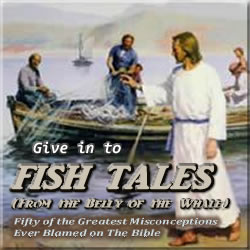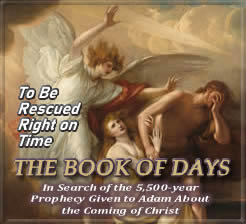To Donate or Not to Donate
That is the Question, Pt. 3 of 5
In chapter after chapter, leading up to the verse that says, “you’ll reap what you sow,” Paul had been confronting a controversy in the church at Galatia. Many there had turned away from the message of faith established by Paul and reverted to a message of works, prompting his famous lament, “Oh, foolish Galatians, who’s bewitched you? Did you receive the Spirit by the works of the Law, or by the hearing of faith?”1
From there, he went on, in the fourth chapter, to differentiate between the two covenants of God—one of law and one of grace. Then, in the fifth chapter, Paul described the covenant of grace, which he called the freedom of Christ. But in describing this freedom from the Law of Mount Sinai, he was quick to warn the Galatians not to take this liberty as a license to fulfill, as he called them, the lusts of the flesh. That’s when Paul described a list of what would keep those who did such things from inheriting the Kingdom of God—among them, immorality, adultery, idolatry, hatred, envy, and murder—which he contrasted with the fruits of the Spirit, such as love, peace, patience, goodness, and faith.
Paul then moved into the sixth chapter, where we come to his comments about sowing and reaping, which if we aren’t careful can easily be confused because of the sensational nature of all that’s preceded those comments. Having described in great detail this division between the flesh and the Spirit, Paul then said:
Whenever someone is overtaken in a fault, you who are spiritual should seek to restore those individuals in a spirit of meekness, just in case you’re ever overtaken by temptation. Bear one another’s burdens, and in doing so, fulfill the Law of Christ. Because whenever anyone thinks they’re somehow special when they really aren’t, they only wind up deceiving themselves. So make sure everyone proves themselves in what they do, and then they’ll be able to rejoice in what they’ve accomplished and not in what someone else has done, because everyone is responsible for their own burden.
And let everyone who’s been taught in the word share the good things they have with the one who’s taught them, and don’t be deceived, because God can’t be mocked. Whatever anyone sows, that’s what they’ll reap. Whoever sows to their flesh will from the flesh reap destruction, while whoever sows to the Spirit will from the Spirit reap eternal life. So don’t grow weary with doing the right thing, because in due time, we’ll reap a harvest, if we refuse to give up.2
Do you see what just happened there? Paul spent five and a half chapters talking about everything under the Sun but giving—in this instance, described as sharing good things. Then suddenly, as if struck by something completely different, he inserted a sidebar that, at first glance, seems quite unrelated to all that preceded it. What’s worse, The King James Bible translators made it even harder to grasp this change in topic because of the way they rendered these verses:
For every man shall bear his own burden. Let him that is taught in the word communicate to him that teaches in all good things.
So, for as long as The King James Bible has held sway over the minds of the Western world, we’ve been led to believe that Paul went from telling everyone to bear their own burden to “communicating” good things to the one who taught them—whatever that’s supposed to mean. No wonder most modern audiences haven’t the slightest idea what Paul said here. First our heads are jammed so full with the lurid description of all the horrible things we’re not supposed to do if we ever want to inherit the Kingdom of God. Then comes the subtle hint that we’re to communicate in all good things to our teacher, which, considering the confusing language of this phrase, can easily have us assuming that what we’re sowing and reaping has everything to do with the sins of the flesh and nothing to do with what Paul was really talking about.
Story Continues Below
Says Richard Price—the founder and CEO of Academia.edu—on his podcast In Depth With Academia:
On Earth as It is On Heaven: The Promise of America, Technology, and the New Earth is:
To hear Price’s book review of On Earth as It is On Heaven, CLICK HERE.
To watch author and historian W. Kent Smith discuss the contents of his book On Earth as It is On Heaven, at the Sacred Word Revealed Conference ‘23, hosted by Zen Garcia, CLICK BELOW.
Story Continues From Above
Fortunately, for the sake of modern readers of The Bible, this word “communicate” has been made more sensible in its being translated as “share.” That’s because the Greek word being translated is koinóneitó, which many Christians will recognize as coming from the more familiar word koinóneó, from which we get such designations as Koinonia Groups. According to Strong’s Exhaustive Concordance, koinóneó means “share,” “communicate,” “contribute,” “impart,” or “fellowship.” It’s from this last meaning that we interpret a Koinonia Group as being a group of fellowship.
In translating this word koinóneitó as “to share” rather than “to communicate,” the meaning of this verse was made clearer, something I’m sure the enemy of God wasn’t at all pleased to see happen. That’s because Satan knows, just as certainly as God knows, a verse like this plays a critical role in furthering the establishment of the Kingdom of God on Earth.
Why do I say that?
I say it because when we finally realize what Paul said here, it puts an entirely different spin on the purpose of Christian giving—one that until now has been distorted because of controlling scriptures like this one being so misunderstood. I say controlling scripture because, as it turns out, this single verse, all by itself, provides the key to understanding not just one principle in the plan of God but several.
As you’ll recall, I began this discussion in a seemingly roundabout way, when I spoke of the old adage that says, “You can’t take it with you.” Hopefully now, considering all that I’ve talked about since that introduction, the connection is becoming more and more apparent. The most obvious way the Galatians passage about sowing and reaping speaks of “taking it with you” is that Paul tells us that when we give to the teacher of God’s word, this act of giving doesn’t just provide a financial benefit to the teacher but also to the one who gives. And if this is true, then the notion that The Bible is saying “we can’t take it with us” turns out to be false. According to Paul, when we give material things to the teacher, in response to their teaching of God’s word, it functions as spiritual seed that ultimately reaps a harvest of life eternal for those who’ve given.
What’s more, if what Paul said is true, we’re presented with quite a conundrum. Until now, tradition has equated sowing and reaping within the narrow confines of either the lusts of the flesh or the fruits of the Spirit. That would mean that when we indulge our flesh, we can expect to reap destruction, whereas if we yield to the Spirit, we can expect to reap eternal life. But based on this new view, this no longer makes sense. What now becomes obvious is that, just as surely as giving to one’s teacher is equated with sowing to the Spirit, giving for any other reason is equated with sowing to the flesh. That’s what I meant when I said this verse is a controlling scripture.
Next comes another way that this verse is a controlling scripture, because apart from this proper context, sowing to the flesh has always been assumed to speak of something we had to do for this reaping of destruction to occur. In other words, when we commit adultery, theft, or murder, then we’re a candidate for this destruction. But if the context controlling Paul’s thinking was giving to the one who teaches the word of God, then this no longer applies. In the context of giving to the teacher, it’s not what we do that sows seeds of destruction but, rather, what we don’t do. That means sowing to the flesh isn’t accomplished through fulfilling the lusts of the flesh but simply refusing to share material things with the one who’s taught us.






